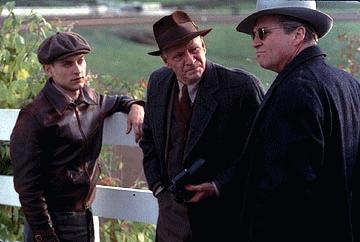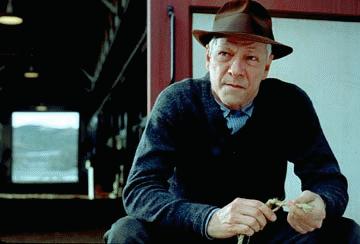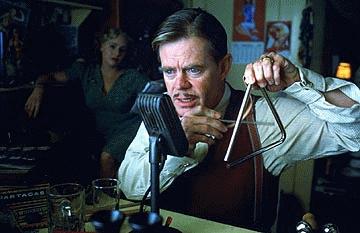|
As America continues waging a culture war with itself, the new movie, "Seabiscuit," may be the only thing all of us can agree on during this torrid Summer of 2003. Tenacity and being kind to animals are right up there with mom and apple pie. So, right now, writer/director, Gary Ross, is in the lead by taking Laura Hillenbrand's best selling 2001 novel and turning it into a very satisfying film for just about the whole family. Although Ross is not out front at the box office with "Seabiscuit," he's at least a furlong to a light year ahead on quality, as most cineplexes across the U.S. are now glutted with spattered blood, spent ammunition, broken glass and stale popcorn. Much of “Seabiscuit” is true. The horse really was a small, somewhat gangly steed who could chew as much as he bit off… and then some. “The Biscuit” really did kick the great War Admiral’s ass in a heat race which is probably the greatest sporting event in American history. He really did seem destined to be a loser, but, ultimately, ignited millions of down-and-out denizens of Depression-ridden America with his in-your-face, never-give-up desire to compete and, by god, Win.
All three men are excellent actors, and, just like Seabiscuit, have impeccable track records. They turn in fine performances, however, Cooper, one of last year's Oscar winners, comes off the winner again here, in a subtle portrayal of the obsolete cowboy who saw "inside" Seabiscuit to understand that the horse had all the right stuff to win. Cooper, with his Kansas City area accent, has spent plenty of time on his family's ranch and resonates in a character any actor would kill for to play. But for the most part, Gary Ross keeps the characters out of his film. The story, with its romantic facts and sentimental manipulation, is the engine that drives “Seabiscuit.” There’s nothing wrong with that, of course, but don’t expect any layering, subtext or much detail in this very straightforward narrative with its spectacular racing scenes and appeal of underdog success.
William H. Macy, just about too good in everything he's been in, plays
a character cooked-up for what is more comic relief that the movie really
needs. Besides social and economic change during Seabiscuit's heyday---from
1936 to 1940---there was also a tinny technological alteration sounding-off
across America. (Does anyone remember Radio?)
So, if you're all steamed-up over arguing about whether or not it's important if weapons of mass destruction are found; if the Judiciary Committee should or shouldn't send up to the Senate a particular nominee to the Federal Bench; or if Michael Powell and two other members of the FCC are or are not out to shaft the little guy, just get out of the heat and treat some agreeable folks to two-hours and twenty-minutes of "Seabiscuit." On second thought, you might even feel better if you take some people who aren't agreeable. “Seabiscuit” Rated PG-13 (language, some sexual situations, sports-related violence). Running time 2:20.
Gary Chew can be reached via email at garychew@comcast.net.
|


 Macy is a quick-tongued, play-by-play,
radio personality named Tick-Tock McGlaughlin, who gives lift to the second
half of the movie with glib Depression Era chatter and silly, mic-side sound
effects. Since Radio is something I feel I know a thing or two about, I can
say confidently that director Ross made up this Tick-Tock character as a
forecast for much of the absurdity attributed to the modern-day version of
this beloved medium to which the Tulsa Broadcast Memories website is partially
dedicated.
Macy is a quick-tongued, play-by-play,
radio personality named Tick-Tock McGlaughlin, who gives lift to the second
half of the movie with glib Depression Era chatter and silly, mic-side sound
effects. Since Radio is something I feel I know a thing or two about, I can
say confidently that director Ross made up this Tick-Tock character as a
forecast for much of the absurdity attributed to the modern-day version of
this beloved medium to which the Tulsa Broadcast Memories website is partially
dedicated.